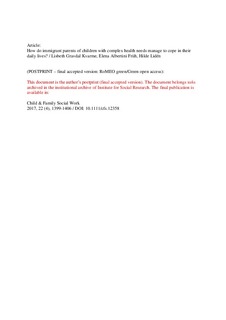| dc.contributor.author | Kvarme, Lisbeth Gravdal | |
| dc.contributor.author | Albertini Früh, Elena | |
| dc.contributor.author | Lidén, Hilde | |
| dc.date.accessioned | 2017-11-21T09:22:18Z | |
| dc.date.available | 2017-11-21T09:22:18Z | |
| dc.date.created | 2017-02-20T17:51:45Z | |
| dc.date.issued | 2017 | |
| dc.identifier.citation | Child & Family Social Work. 2017, 22 (4), 1399-1406. | |
| dc.identifier.issn | 1356-7500 | |
| dc.identifier.uri | http://hdl.handle.net/11250/2467274 | |
| dc.description.abstract | Daily life with children who have complex health needs can be stressful for parents. Immigrant parents are vulnerable to stress because they may lack language skills and knowledge about the health care system and have limited social networks. In this study, we focus on how immigrant parents of children with complex health needs use emotion-focused and problem-focused coping strategies to manage their daily life, and how their self-efficacy and the immigration process may affect their coping. This qualitative study had an exploratory design with individual and focus group interviews. The sample comprised 27 parents—18 mothers and 9 fathers—from Pakistan, Poland, and Vietnam. The findings indicated that the parents' love for their child helps them to cope in their daily life. Newly arrived migrants, single mothers with a severely ill child who lacked support and migrant parents with language difficulties struggle to cope. Some of the stress is related to personal, social and structural problems, and to the insufficient resources available to meet the child's needs. The parents used both emotion-focused and problem-focused coping strategies. The parents noted that access to both universal and selective welfare services is an important factor that contributed to their self-efficacy and coping. | |
| dc.language.iso | eng | |
| dc.title | How do immigrant parents of children with complex health needs manage to cope in their daily lives? | |
| dc.type | Peer reviewed | |
| dc.type | Journal article | |
| dc.description.version | publishedVersion | |
| dc.description.version | acceptedVersion | |
| dc.source.pagenumber | 1399-1406 | |
| dc.source.volume | 22 | |
| dc.source.journal | Child & Family Social Work | |
| dc.source.issue | 4 | |
| dc.identifier.doi | 10.1111/cfs.12358 | |
| dc.identifier.cristin | 1452454 | |
| dc.relation.project | Norges forskningsråd: 227022 | |
| cristin.unitcode | 7437,0,0,0 | |
| cristin.unitname | Institutt for samfunnsforskning | |
| cristin.ispublished | true | |
| cristin.fulltext | original | |
| cristin.fulltext | postprint | |
| cristin.qualitycode | 2 | |
